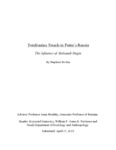| dc.rights.license | In Copyright | en_US |
| dc.creator | Rivkin, Naphtali D. | |
| dc.date.accessioned | 2015-07-29T20:13:29Z | |
| dc.date.created | 2015 | |
| dc.identifier | WLURG38_Rivkin_RUSS_2015 | |
| dc.identifier.uri | http://hdl.handle.net/11021/32179 | |
| dc.description | Thesis; [ACCESS TO FULL-TEXT IS RESTRICTED. REQUESTS WILL BE SUBMITTED TO THE AUTHOR.] | en_US |
| dc.description | Naphtali D. Rivkin is a member of the Class of 2015 of Washington and Lee University. | en_US |
| dc.description.abstract | Analyzing Russia as a totalitarian state is useful because it seems to help explain why Russia invaded Ukraine in 2014. By analyzing Russia as a totalitarian state, this paper rejects and aims to disprove attempts to analyze Russia as either a democratic or authoritarian state, as neither of these frameworks explain Russia's internal and foreign policy since the ascension of Vladimir Putin to office in a satisfactory way. It is useful for us to see Russia as a totalitarian state that organizes itself domestically and determines its international policy based on ideological and dogmatic principles because doing so may help us more accurately predict Russia's future international aggression.
This paper begins by unpacking Hannah Arendt's definition of totalitarianism and paralleling it with Russian domestic policy and institutions of the last ten years in order to see if Russia meets Hannah Arendt's criteria for a totalitarian state. The most significant component of Hannah Arendt's definition of totalitarianism is a governing ideology and dogma that organizes society and informs a totalitarian state's domestic and foreign policy. This paper posits that Russia, a totalitarian state in line with Hannah Arendt's definition, is governed by the Eurasian ideology of Aleksandr Dugin, a Russian academic and writer, whose textbook The Foundations of Geopolitics influenced a generation of young Russian military and civil leaders after the fall of the Soviet Union.
After explaining Dugin's Eurasian ideology, this paper will attempt to link Dugin's ideology to Russia's governing policy by analyzing Putin's speeches and actions since 2012. It may not be possible to definitively link Putin to Dugin, and this thesis will show that a range of scholars debate Dugin's influence in Putin's government. But in the end, this thesis concludes that the similarities between Dugin's philosophy and Putin's actions and rhetoric as President of Russia are so similar as to be more than coincidence, and Dugin's Eurasian ideology sufficiently meets Hannah Arendt's criteria for the governing philosophy of an emerging totalitarian society in Russia. By concluding with some of the most current news events in Russia, this paper demonstrates that Russia is continuously and steadily moving toward a totalitarian ideal, not away from it. | en_US |
| dc.description.statementofresponsibility | Naphtali Rivkin | |
| dc.format.extent | 65 pages | en_US |
| dc.language.iso | en_US | en_US |
| dc.rights | This material is made available for use in research, teaching, and private study, pursuant to U.S. Copyright law. The user assumes full responsibility for any use of the materials, including but not limited to, infringement of copyright and publication rights of reproduced materials. Any materials used should be fully credited with the source. | en_US |
| dc.rights.uri | http://rightsstatements.org/vocab/InC/1.0/ | en_US |
| dc.subject.other | Washington and Lee University -- Honors in Russian | en_US |
| dc.title | Totalitarian Trends in Putin's Russia: The Influence of Aleksandr Dugin (thesis) | en_US |
| dc.type | Text | en_US |
| dcterms.isPartOf | RG38 - Student Papers | |
| dc.rights.holder | Rivkin, Naphtali D. | |
| dc.subject.fast | Totalitarianism | en_US |
| dc.subject.fast | Russia | en_US |
| dc.subject.fast | Putin, Vladimir Vladimirovich, 1952- | en_US |
| dc.subject.fast | Dugin, Aleksandr | en_US |
| local.department | Russian | en_US |
| local.scholarshiptype | Honors Thesis | en_US |
